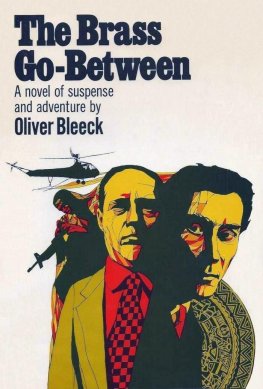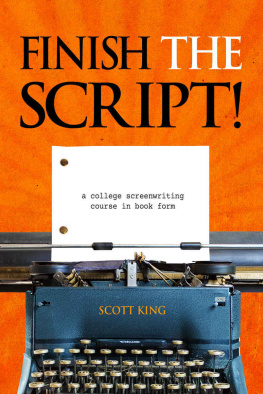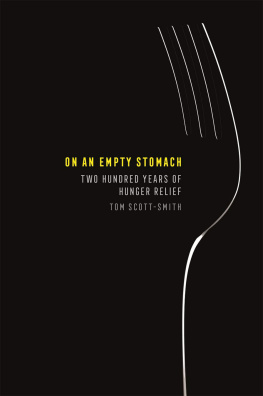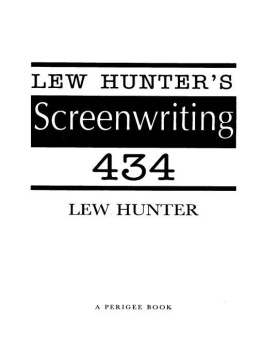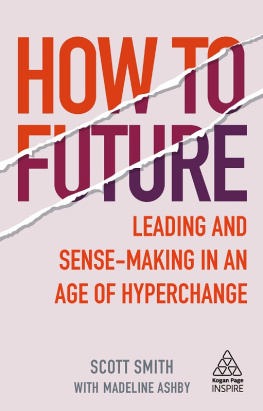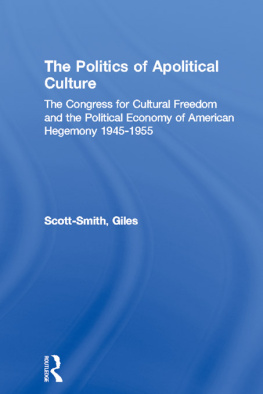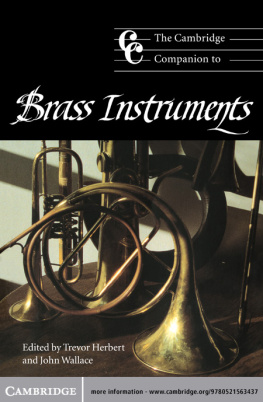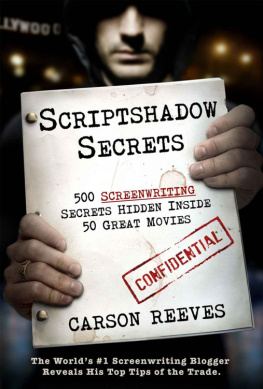Scott W. Smith - Screenwriting with Brass Knuckles : Book 1
Here you can read online Scott W. Smith - Screenwriting with Brass Knuckles : Book 1 full text of the book (entire story) in english for free. Download pdf and epub, get meaning, cover and reviews about this ebook. year: 2020, genre: Detective and thriller. Description of the work, (preface) as well as reviews are available. Best literature library LitArk.com created for fans of good reading and offers a wide selection of genres:
Romance novel
Science fiction
Adventure
Detective
Science
History
Home and family
Prose
Art
Politics
Computer
Non-fiction
Religion
Business
Children
Humor
Choose a favorite category and find really read worthwhile books. Enjoy immersion in the world of imagination, feel the emotions of the characters or learn something new for yourself, make an fascinating discovery.
- Book:Screenwriting with Brass Knuckles : Book 1
- Author:
- Genre:
- Year:2020
- Rating:5 / 5
- Favourites:Add to favourites
- Your mark:
- 100
- 1
- 2
- 3
- 4
- 5
Screenwriting with Brass Knuckles : Book 1: summary, description and annotation
We offer to read an annotation, description, summary or preface (depends on what the author of the book "Screenwriting with Brass Knuckles : Book 1" wrote himself). If you haven't found the necessary information about the book — write in the comments, we will try to find it.
Screenwriting with Brass Knuckles : Book 1 — read online for free the complete book (whole text) full work
Below is the text of the book, divided by pages. System saving the place of the last page read, allows you to conveniently read the book "Screenwriting with Brass Knuckles : Book 1" online for free, without having to search again every time where you left off. Put a bookmark, and you can go to the page where you finished reading at any time.
Font size:
Interval:
Bookmark:
Screenwriting with Brass Knuckles
Book 1
Scott W. Smith
Copyright 2020 Scott W. Smith
All rights reserved
ISBN: 978-0-578-75001-9
ISBN: 978-0-692-06291-3 (eBook)
Book Cover Design
Predrag Capo
(CsapoDesign at 99designs.com)
For Annye Refoe, Ph.D.
who pointed the way beyond the eighty-yard run.
Contents
Acknowledgements
A small tribe of people helped this book become a reality:
Edd Blott, Amy Bosley, Casey Frechette, Terry Groner, Cindy Gustafson, Kelsey Holm, Steve Holm, Calvin Johannsen, Gary Kelley, Joel Laneville, Adam Lewis and the gang at Spinutech, Michael Maguire, Josh McCabe, Trish Miceli, Curt Moore, Doug Nairn, Lisa Oharek, Matthew Porter, Sally Preston, Marc Reifenrath, Julie Smith, Ken Steele, Kevin A. Thomas, Jon Van Allen, and readers of the blog Screenwriting from Iowa... and Other Unlikely Places
Editor
Scott Draper
Foreword
Note: Scott Beck and Bryan Woods wrote the screenwriting equivalent of brass knuckles with their screenplay A Quiet Place. They had humble beginnings starting in a middle school in Iowa where they metless than 30 miles from Dyersville, Iowa where Field of Dreams was shot and the words If you build it, he will come were first spoken on film.SWS
Growing up as cinephiles in Iowa, we were inundated with the often-misquoted mantra If you build it, they will come. We heard that phrase so often, that it was easy to overlook the metaphorical meaning beneath the surface; the idea that the only way to achieve an impossible dream is to put imagination into action. So as aspiring filmmakers, we realized we couldnt wait for permission to write or direct. It didnt matter that we were 1,600 miles away from Hollywood, or that our backlot consisted of the Mississippi River, or that our budgets were hundreds of dollars instead of millions. We were going to make movies hell or high water.
Your greatest ability as a writer and filmmaker is to create your own opportunities. That may mean many different things: picking up a camera, jotting down story ideas in a journal, producing a local play, or reading this book for advice and inspiration. Every career begins with a small step.
Our career started as teenagers, the day we decided to make our own films in our backyard. We would hold casting calls throughout Iowa, curate test screenings at the community college, and premiere our movies at the local IMAX theater. Then wed do it again and again, learning from each of our mistakes.
If your journey is anything like ours, at some point youll hit a wall. Festivals will reject your screenplay. Agencies will pass on representing you. Executives are going to tell you no. Then maybe one day, someone will say yes to your script. A financier will come on board. Your movie is greenlit and your screenplay gets produced. A major distributor buys the film. Youve conquered Hollywood!
Then the third act twist happens: no one sees your film. Youre back to the basics.
Now you have to fight for the next job harder than everyone else. Whether its luck or tenacity, you get another script set up at a huge studio. Maybe youll spend a year of your life developing the screenplay until your producers are happy. Thats when you realize the studio will only make the movie if Hollywoods hottest A-list actor will come onboard. He wont, and the studio cans the project.
You realize films are hard to get made, but television is a gold rush. You take one of your discarded feature ideas and adapt it into a series pitch. A producer is interested and sets up meetings with a dozen studios. All of them pass but one. They want to pay you to write the script, but only if they can get a network on board to co-finance. The studio arranges over 30 meetings with different networks. In every room, you have to perform your 25-minute pitch. You come incredibly close to selling the show, but after several weeks everyone passes.
When you get to this point in your career, you might want to quit. Dont. You cant succeed until you fail. And you cant fail until you create.
Our breakthrough came after two decades of creating. We had encountered countless setbacks and hurdles when we dusted off an idea that had been long gestating, called A Quiet Place . The concept was something we had loved forever, and knew if no one in Hollywood wanted to produce the film, we could go back to Iowa and make it ourselves. We finished the script in a few months, knowing that failure and success arent factors in determining our journey. All that mattered is that we would create something ourselves.
Your fate is in your hands. The good news is, youve already taken the initiative by reading this book. It doesnt matter if youre from Iowa or Iceland. You dont need an agent or a manager. You dont need to place first in a screenplay competition. You dont need to wait to wait for permission. All you need, is to start.
If you build it, they will come.
Scott Beck & Bryan Woods
September 2020
Preface
I wasnt born knowing how to write a play.
Sam Shepard, Pulitzer Prize winning playwright
I wrote screenplays as a way to get into production. I wrote six or seven before I sold one.
Lawrence Kasdan (Raiders of the Lost Ark, Star Wars: Episode V)
In the more than 12 years of writing the blog Screenwriting from Iowa... and Other Unlikely Places , Ive found advice and insight on the creative process from more than 700 gifted screenwriters, filmmakers, and teachers. I realized that I could consolidate and curate the most powerful of that material as a book, revising and reorganizing it in ways that I thought would be most helpful to peoples creative journeys. I want these ideas to function like brass knuckles in an old-school professional wrestling match.
I dont know if Aristotle ever used brass knuckles, but they are said to have been around since the ancient Greeks. President Abraham Lincolns secret service men carried brass knuckles. And legend has it that brass knuckles were gangster Al Capones favorite weapon.
The term loaded fist in Japanese martial arts refers to a martial arts version of brass knuckles that can turn a punch into a sledgehammer. As a troubled youth in Hong Kong, Bruce Lee carried brass knuckles, giving a twist of meaning to his trademark movie Fist of Fury.
Today brass knuckles are brandished in popular video games and music videos. Spike Lee even wore brass knuckles to the 2019 Academy Awards.
My introduction to brass knuckles was watching professional wrestling on TV as a kid. This was not the high-dollar spectacle of today but the low-budget version, usually taped in a small studio in Tampa, Florida.
Actor Dwayne The Rock Johnsons father, Rocky Johnson, was a wrestler in the pre-WWE era when professional wrestling was more regionally orientated and the bag of tricks and storylines were more limited. (Rocky Johnson was actually the 1976 NWA Brass Knuckles Champion.)
This was at a time in my youth when I didnt know if professional wrestling was real or not. What I did know was that professional wrestling had a cast of characters with colorful names like Abdullah the Butcher, Andr the Giant, and Dusty The American Dream Rhodes and it was flat out entertaining. (Rhodes was the main influence Hulk Hogan used as Hulkamania helped transform pro wrestling into a global phenomenon.)
Inevitably, back then when one wrestler was getting beat up and close to losing a match, brass knuckles would magically appear (usually emerging from someones wrestling trunks).
The announcer Gordon Solie would say something like, Wait a minute, whats he have in his right hand? It looks like a foreign object. Oh no, it looks like a pair of brass knuckles!
Font size:
Interval:
Bookmark:
Similar books «Screenwriting with Brass Knuckles : Book 1»
Look at similar books to Screenwriting with Brass Knuckles : Book 1. We have selected literature similar in name and meaning in the hope of providing readers with more options to find new, interesting, not yet read works.
Discussion, reviews of the book Screenwriting with Brass Knuckles : Book 1 and just readers' own opinions. Leave your comments, write what you think about the work, its meaning or the main characters. Specify what exactly you liked and what you didn't like, and why you think so.

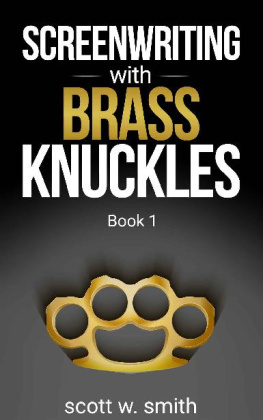
![Erl Gardner - Bunched Knuckles [story]](/uploads/posts/book/911418/thumbs/erl-gardner-bunched-knuckles-story.jpg)
